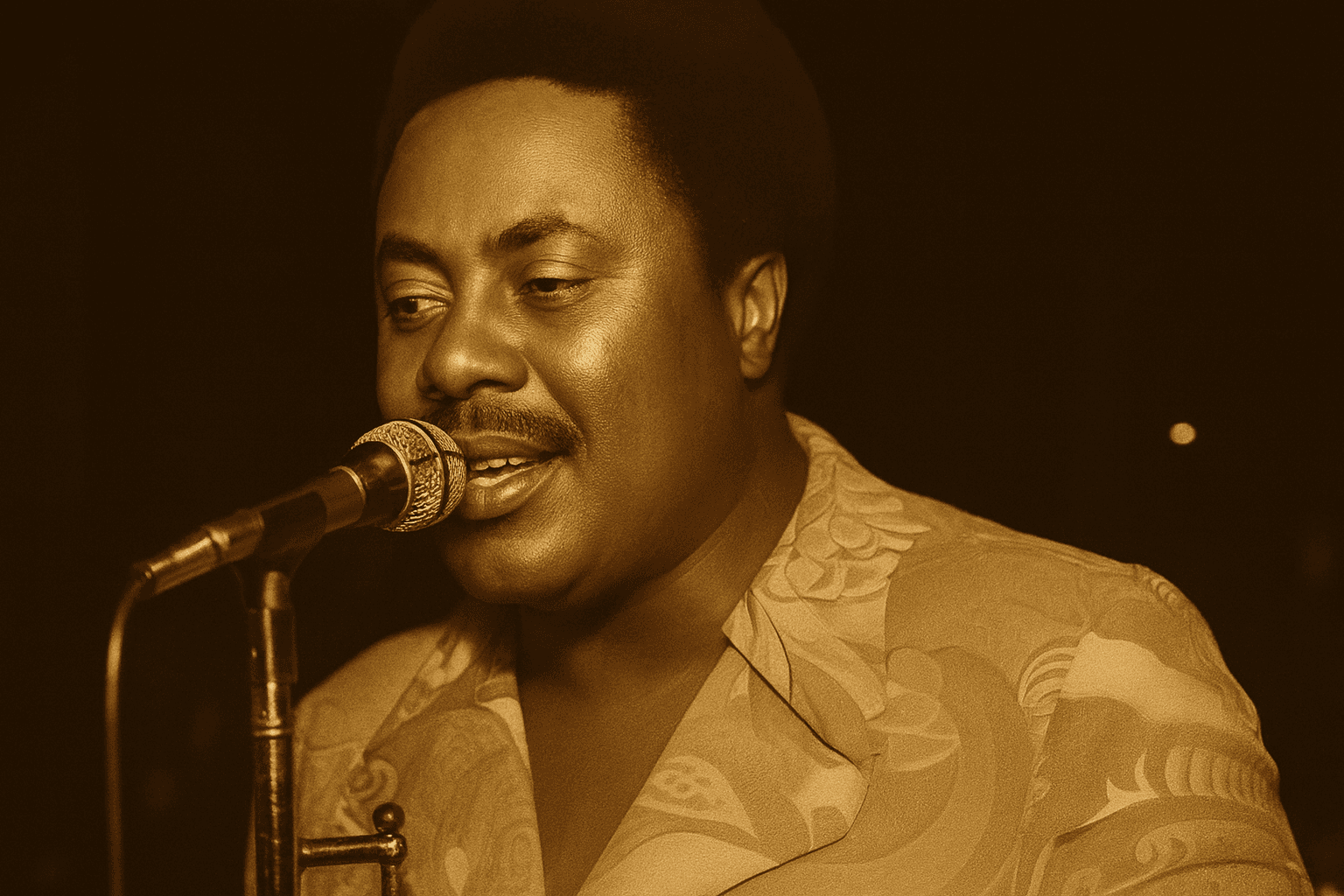
Djo Mpoyi: The Soulful Voice of TPOK Jazz
The Life and Legacy of Djo Mpoyi
Djo Mpoyi, born Joseph Kanyinda Mpoyi on September 23, 1954, in Bujumbura, Burundi, remains one of the most cherished figures in Congolese rumba and soukous music. Known for his warm, emotional voice and poetic delivery, Mpoyi helped shape the golden era of Congolese music as a leading member of TPOK Jazz, the legendary band led by Franco Luambo Makiadi. His career spanned more than two decades of soulful performances, collaborations, and compositions that continue to inspire generations of African musicians.
Early Life and Musical Beginnings
Raised in Lubumbashi, Katanga, Djo Mpoyi was born to a Burundian father and a Congolese mother, an upbringing that exposed him to diverse musical influences from Central and East Africa. He began singing at just 13 years old, performing with local bands such as Tao Tao, Lovy du Zaire, and Orchestre Kara de Kinshasa. These early experiences sharpened his voice, stage presence, and understanding of Lingala music, laying the foundation for a remarkable career.
Mpoyi’s early songs showcased his smooth tenor and emotional range, traits that later became his signature style. By the mid-1970s, his reputation had spread across the Congolese music scene, leading to his breakthrough opportunity with one of Africa’s greatest bands.
Joining TPOK Jazz – A Defining Moment
In 1978, Djo Mpoyi joined Franco’s TPOK Jazz, marking the beginning of his ascent to stardom. The band, already a powerhouse in African rumba, provided the perfect platform for Mpoyi’s expressive vocals. He quickly became one of the band’s standout singers, performing alongside iconic names such as Sam Mangwana, Ndombe Opetum, and Josky Kiambukuta.
With TPOK Jazz, Mpoyi lent his voice to several timeless classics, including:
“Mandola” (1981, composed by Simaro Lutumba)
“Katebe”
“Aziza Mon Amour”
“Na Bali Misère” (written by Mayaula Mayoni)
Each of these songs showcased his ability to blend romance, melancholy, and soulful reflection—hallmarks of the Congolese rumba tradition. His delivery was deeply emotional yet disciplined, a quality that resonated with audiences across Africa and beyond.

Collaborations and Artistic Evolution
Beyond TPOK Jazz, Djo Mpoyi was known for his collaborative spirit. He worked closely with Lukoki Diatho, sharing stages and harmonies that enriched the depth of the TPOK Jazz vocal line-up. He also teamed up with legendary artists such as Mayaula Mayoni, Verckys Kiamuangana, and Lokassa Ya M’Bongo, expanding his musical footprint across Africa’s soukous network.
In 1983, Mpoyi joined Tiers Monde Coopération, a band that included several former TPOK Jazz members. This period saw him experiment with faster soukous rhythms and more modern arrangements while maintaining his lyrical depth and emotional storytelling. His versatility allowed him to adapt effortlessly to evolving musical trends while keeping his rumba roots intact.
After a few years away, Mpoyi returned to TPOK Jazz in 1986, contributing new vocal power to the group until Franco’s death in 1989. During this period, he recorded memorable tracks such as “Masikini” and “Celio,” reaffirming his place among the elite voices of African music.
Musical Style and Influences
Djo Mpoyi’s music can be best described as romantic, soulful, and profoundly emotional. His style sits at the intersection of Congolese rumba and soukous, blending traditional Lingala rhythms with modern instrumentation. He was known for his melodic phrasing, his ability to harmonize effortlessly, and his emotional expressiveness that brought stories of love, heartbreak, and hope to life.
His performances often emphasized lyrical clarity and vocal warmth, appealing to fans across the Francophone world. In songs like “Aziza Mon Amour” and “Na Bali Misère,” Mpoyi expressed the tender vulnerability that defined the Lingala music tradition—transforming everyday emotions into timeless poetry.
Notable Songs by Djo Mpoyi
Throughout his career, Djo Mpoyi contributed to numerous hits that continue to receive airplay across Africa and in the Congolese diaspora. Some of his best-known songs include:
“Mandola” – A soulful rumba classic composed by Simaro, featuring Mpoyi’s heartfelt vocals.
“Katebe” – Known for its haunting melody and emotional lyrics.
“Aziza Mon Amour” – A love song that epitomizes the romantic side of Congolese rumba.
“Na Bali Misère” – A reflective track on life’s hardships, written by Mayaula Mayoni.
“Masikini” – One of his later works with TPOK Jazz, showcasing maturity and emotional depth.
“Celio” – A fan favorite featuring rich vocal harmonies and gentle guitar riffs.
These songs illustrate Mpoyi’s ability to balance elegance with passion, a rare gift that positioned him among the finest vocalists of his generation.
Career Timeline
Year Event/Group Description
1967 Lubumbashi debut Began singing career at age 13
1978–1982 TPOK Jazz (1st tenure) Delivered signature vocal performances on major hits
1983 Tiers Monde Coopération Collaborated with Diatho and Verckys
1986–1989 TPOK Jazz (2nd tenure) Featured on “Masikini” and “Celio”
1990–1993 Solo & collaborations Continued performing and recording
1993 Passed away Remembered as a legend of Congolese rumba
Legacy and Influence on Congolese Music
Djo Mpoyi passed away unexpectedly on September 19, 1993, in Kinshasa, but his voice remains immortal in the archives of African music. His work helped shape the emotional and melodic foundation of modern Congolese rumba and soukous, influencing countless artists who followed.
Mpoyi’s legacy lives on through the enduring appeal of TPOK Jazz and the continued popularity of Lingala music across Africa, Europe, and the Americas. His romantic ballads, warm tone, and authentic delivery serve as a reminder of a golden era when music spoke directly to the soul.
Conclusion: Djo Mpoyi’s Enduring Melody
Djo Mpoyi’s contribution to Congolese rumba and soukous transcends generations. As a singer, composer, and performer, he brought emotion, harmony, and authenticity to every song he touched. His collaborations with Franco and the TPOK Jazz family helped define a musical legacy that remains central to African culture today.
Whether through the poignant lyrics of “Na Bali Misère” or the romantic strains of “Aziza Mon Amour,” Djo Mpoyi’s music continues to captivate fans worldwide—proof that true artistry never fades.



